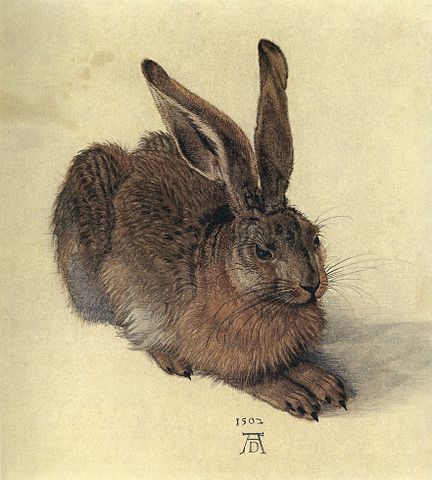 |
This is a file from the Wikimedia Commons. Information from its description page there is shown below.
Commons is a freely licensed media file repository. You can help.
|
Summary
| Artist |
Albrecht Dürer (1471–1528)    |
 |
| Alternative names |
Albrecht Dürer |
| Description |
German painter, printmaker, engraver and mathematician
|
| Date of birth/death |
21 May 1471 |
6 April 1528 |
| Location of birth/death |
Nuremberg |
Nuremberg |
| Work location |
Nuremberg (1484–1490), Basel (1490–1494), Strasbourg (1490–1494), Colmar (1490–1494), Frankfurt am Main (1490–1494), Mainz (1490–1494), Cologne (1490–1494), Nuremberg (21 May 1494–1528), Innsbruck (1494), Venice (1494–1495), 1505–1506), Bologna (1505–1506), Milan (1505–1506), Florence (1505–1506), Rome (1505–1506), Augsburg (1518) |
| Authority control |
|
|
| Title |
Deutsch: "Junger Hase"
English: A Young Hare
|
| Date |
1502 |
| Medium |
Gouache, watercolor on paper |
| Dimensions |
251 × 226 mm (9.88 × 8.9 in) |
| Current location |
Graphische Sammlung Albertina |
| Vienna |
| Source/Photographer |
Scanned from book |
Permission
( Reusing this file) |
This is a faithful photographic reproduction of an original two-dimensional work of art. The work of art itself is in the public domain for the following reason:
| Public domainPublic domainfalsefalse |
 |
This work is in the public domain in the United States, and those countries with a copyright term of life of the author plus 100 years or less. |
|
This file has been identified as being free of known restrictions under copyright law, including all related and neighboring rights.
|
The official position taken by the Wikimedia Foundation is that "faithful reproductions of two-dimensional public domain works of art are public domain, and that claims to the contrary represent an assault on the very concept of a public domain". For details, see Commons:When to use the PD-Art tag.
This photographic reproduction is therefore also considered to be in the public domain. Please be aware that depending on local laws, re-use of this content may be prohibited or restricted in your jurisdiction. See Commons:Reuse of PD-Art photographs.
|
|
This selection has made Wikipedia available to all children. SOS Children believes education is an important part of a child's life. That's why we ensure they receive nursery care as well as high-quality primary and secondary education. When they leave school, we support the children in our care as they progress to vocational training or higher education. There are many ways to help with SOS Childrens Villages.




